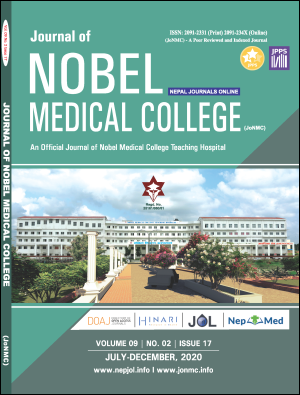Insights into Cardiovascular Disease Risk Based on Platelet Indices and Lipid Ratios in Reference to Glycemic Control and Duration of Diabetes
DOI:
https://doi.org/10.3126/jonmc.v9i2.33488Keywords:
Cardiovascular disease, Glycemic control, LipidAbstract
Background: Diabetic patients are at the risk of untimely atherosclerotic cardiovascular disease. The level of blood lipids, their ratios, glycosylated hemoglobin, and platelet indices are potential markers for the assessment of cardiovascular disease risk in diabetic patients. This study aims to insights into cardiovascular disease risk among diabetic patients in reference to glycemic control and duration of diabetes on the basis of lipid ratios and platelet indices by comparing with healthy controls.
Materials and Methods: A case control study was carried out among the patients, diagnosed as type 2 diabetes mellitus at Dhulikhel hospital-Kathmandu University hospital. Socio-demographic questionnaire, anthropometric measurements, and biochemical tests was performed. Descriptive analysis and independent T-test for the testing relationship between categorical variables along with correlation was done.
Results: Nearly one-third of diabetic patients were under poor glycemic control with high risk of cardiovascular diseases on the basis of blood lipid ratios and platelet indices. Cardiac risk ratio, Atherogenic Index of Plasma, and Atherogenic Coefficient was found to be significantly high in diabetic compared to the control group (5.22±1.54 vs. 3.71±0.99, p <0.05), (0.33±0.18 vs. 0.22±0.14, p <0.05), (4.22±1.54 vs. 2.71±0.99, p <0.05) respectively. Similarly Mean Platelet Volume was also significantly higher in diabetic compared to the control group (10.16±1.43 vs. 9.06±0.81, p <0.05).
Conclusion: Poor glycemic control seems riskier than prolonged diabetes on the basis of blood lipids, their ratios and platelet indices.
Downloads
Downloads
Published
How to Cite
Issue
Section
License
JoNMC applies the Creative Commons Attribution (CC BY) license to works we publish. Under this license, authors retain ownership of the copyright for their content, but they allow anyone to download, reuse, reprint, modify, distribute and/or copy the content as long as the original authors and source are cited.




